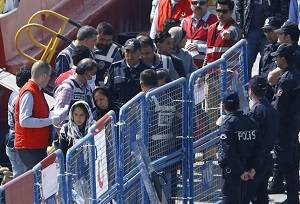Turkey is ready to take in another 200 migrants deported from the Greek islands this week, a senior government official said, as it presses ahead with a disputed EU deal aimed at shutting down the main route for illegal migration into Europe.
A first group of 202 migrants, mostly Pakistani and Afghan, were shipped back to Turkey on Monday under an agreement which will see Ankara take back all migrants and refugees who cross the Aegean to enter Greece illegally.
In return, the European Union will take in thousands of Syrian refugees directly from Turkey and reward it with money, visa-free travel and progress in its EU membership negotiations.
"This arrangement will prevent the Aegean Sea being turned into a cemetery for migrants," Turkish Prime Minister Ahmet Davutoglu said in parliament of a deal meant to dissuade migrants from attempting perilous illegal sea crossings.
Turkey was initially expecting a second group of 200 migrants to be sent back on Wednesday, but the government official said Greek authorities had informed their Turkish counterparts that the move would be delayed until Friday.
The pact has been criticized by refugee agencies and human rights campaigners, who have cast it as inhumane, questioned its legality, and argued Turkey is not a safe country for refugees.
Several dozen migrants being detained at a holding camp on the Greek island of Lesbos protested behind the barbed wire fence of the compound on Tuesday, shouting "We want freedom!"
They were among thousands of refugees and migrants who have arrived on Lesbos on or since March 20 from Turkey and who are being held until their asylum requests are processed and they are accepted or sent back under the deal.
The first group of returnees from Greece were brought from Lesbos and Chios to the Turkish Aegean coastal town of Dikili on Monday. They were then taken in buses escorted by gendarmes to a "reception and removal" center in a fenced compound in the town of Kirklareli near the Bulgarian border, from where most are expected to be sent back to their home countries.
On parts of Turkey's Aegean coast where refugees had long gathered before attempting to cross the Aegean, the deterrent effect of the EU deal, struck last month, is apparent.
Turkish security forces have increased checkpoints on roads in a bid to detain would-be migrants. Syrian and other refugees who once packed the cafes and hostels of Basmane, a district of the region's biggest city Izmir, have all but disappeared.
"There's no work. The hotel has been empty for the last 20 days," said Mehmet, whose Basmane hotel had done a thriving trade sheltering migrants in the months ahead of the deal.
But some stores in the neighborhood still stock unlicensed life jackets and, despite the risks, migrants are still trying to cross. Altogether, more people arrived on the Greek islands in the 24 hours to Monday morning than were transported to Turkey, Greek authorities said.
Those returned from Greece on Monday included 130 Pakistanis, 42 Afghans, as well as nationals of Iran, Congo, Sri Lanka, Bangladesh, India, Iraq, Ivory Coast and Somalia, people familiar with an internal European Commission report said.
There were also two Syrians who had requested a return to Turkey, Turkish officials said.
Davutoglu said a first group of 78 Syrians had been sent to Europe in return as part of the deal. Thirty-two went to Germany, 11 to Finland and another 34 were expected to go on
Tuesday to the Netherlands, the European Commission report said.
Rights groups and some European politicians have challenged the legality of the deal, questioning whether Turkey has sufficient safeguards in place to defend refugees' rights and whether it can be considered safe for them.
The United Nations refugee agency UNHCR has stopped transporting arrivals to and from the Moria camp on Lesbos, initially set up to register arrivals but which has since become what UNHCR calls a "detention center".
Through barbed wire at the camp, one man held up a piece of cardboard, which read: "Kill us if you want."
On the wall of the sprawling gated complex, which was once an army camp, graffiti read: "No one is illegal".
UNHCR says there are some 600 people above capacity at Moria, including pregnant women, lactating mothers and children, with insufficient food. Other aid groups have also pulled out from the site in protest at conditions there.
PHOTO CAPTION
Migrants are escorted by Turkish police officers as they arrive in the Turkish coastal town of Dikili, Turkey, April 4, 2016.
Reuters


 Home
Home Discover Islam
Discover Islam Quran Recitations
Quran Recitations Lectures
Lectures
 Fatwa
Fatwa Articles
Articles Fiqh
Fiqh E-Books
E-Books Boys & Girls
Boys & Girls  Ramadan
Ramadan Fatwa Audios
Fatwa Audios Month of Mercy
Month of Mercy Women
Women Eed Al- Fitr
Eed Al- Fitr Food Recipes
Food Recipes Videos
Videos

 Prayer Times
Prayer Times












